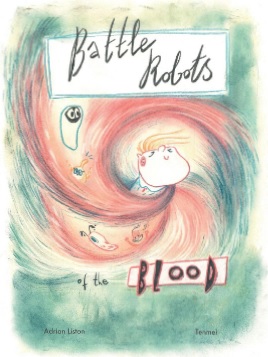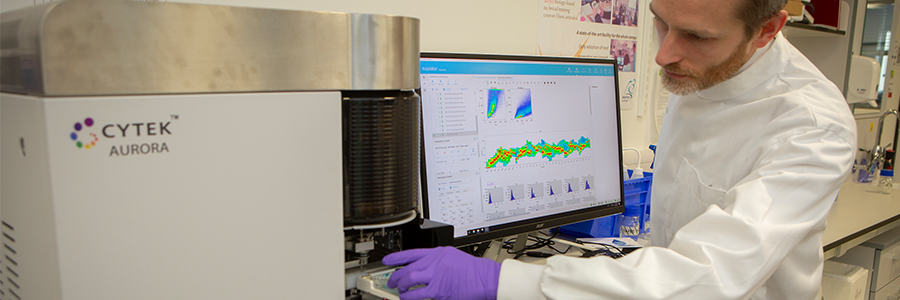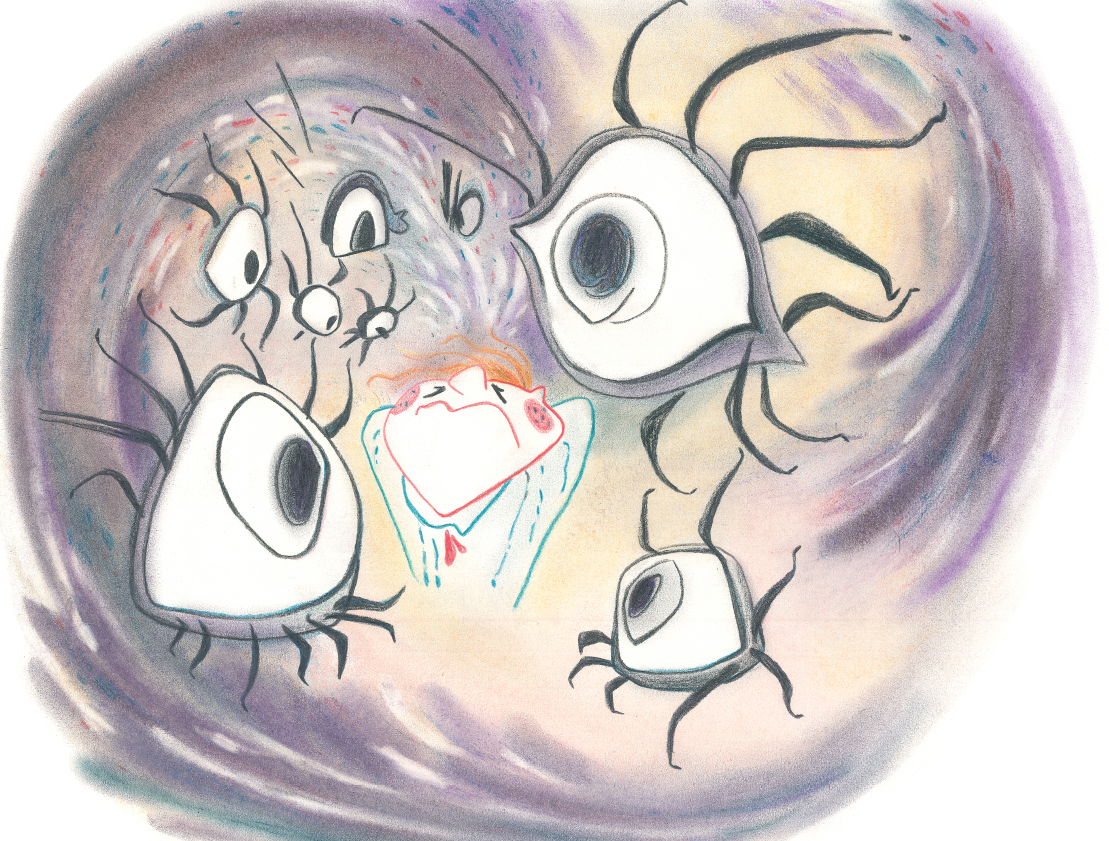Congratulations Dr Steffie Junius!
 Tuesday, June 1, 2021 at 2:43PM
Tuesday, June 1, 2021 at 2:43PM 
 Liston lab,
Liston lab,  women in science
women in science Virus Fighter
Build a virus or fight a pandemic!
Maya's Marvellous Medicine
Battle Robots of the Blood

Just for Kids! All about Coronavirus
 Tuesday, June 1, 2021 at 2:43PM
Tuesday, June 1, 2021 at 2:43PM 
 Liston lab,
Liston lab,  women in science
women in science  Monday, May 17, 2021 at 12:10PM
Monday, May 17, 2021 at 12:10PM  Key points:
Key points:
Flow cytometry is a key investigative tool used in biomedical research, allowing researchers to identify, separate and study cells according to their characteristics, often working with cell samples containing millions of cells at an analysis pace of a million cells per minute. Cell identification is achieved by labelling cells with fluorescent tags. As with personal gadgets and devices, innovation in molecular biology technologies isn’t standing still. Advances in flow cytometry have allowed scientists to gather data on a growing number of parameters, simultaneously detecting over 30 different tags at a time to allow more sophisticated analyses and much deeper levels of insight. However, while flow cytometry equipment has been updated, the accompanying computational requirements have received less attention, until now. AutoSpill, an algorithm developed by researchers at the Babraham Institute and the VIB Center for Brain Research, brings data processing in line with state-of-the-art machines, simplifying data analysis and increasing accuracy. The new technique is published in Nature Communications today.
Immunology programme senior group leader Prof. Adrian Liston, explained: "Flow cytometry is a foundational technology across many different biomedical research areas, and is a key diagnostic tool in immunology, haematology and oncology. Despite the technical progress over the past decades, the technology has been held back by the mathematical processing of the data. Our new approach reduces error by 100,000-fold, making research and diagnostics more accurate. The collaboration with FlowJo has enabled us to instantly reach 80,000 users. It is very gratifying to see computational biology have a direct and real impact on research and diagnostics."
Using multiple fluorescent signals raises a key issue in flow cytometry called spillover. Spillover occurs because each tag, called a fluorophore, emits light within a range of wavelengths, giving it a unique colour. When multiple fluorophores are used, the signals begin to overlap. To accurately distinguish between two distinct fluorophore signals, researchers must process their data to compensate. Because flow cytometry uses so many different colour tags on each cell, the spillover between colours quickly accumulates, limiting scientists’ power to draw reliable conclusions from their results. The processing of data to remove the spillover between the different colours, known as compensation, is necessary for all flow cytometry experiments. Current methods require many hours of manual work, but AutoSpill reduces the process to minutes.
Dr Rachael Walker, Head of the Institute Flow Cytometry facility, commented: “The new AutoSpill Fluorescence Compensation algorithm is a great tool for quick, simple and accurate compensation. It allows compensation to be accurately calculated on samples where the traditional algorithm is difficult to use. AutoSpill’s integration into the FlowJo post-acquisition software highlights the importance of this new compensation method.”
Another limitation of flow cytometry is autofluoresence, fluorescence produced naturally by cells. The removal of these artefacts by AutoSpill is particularly useful for cancer biologists as tumour cells are high in autofluorescence, which can confuse identification of the type of tumour cell present. By solving these sources of error, AutoSpill can help remove false positives from cell analyses, ensuring more accurate data interpretations.
AutoSpill is available through open source code and a freely-available web service. AutoSpill, and a complementary related tool, AutoSpread, are also available in FlowJo v.10.7. Dr John Quinn, Director of Science and Product Development, FlowJo added: “AutoSpill & AutoSpread have been a revelation for FlowJo users. Compensation has long been one of the most perplexing aspects of cytometry, with the most critical requirement being pristine compensation controls collected for each and every parameter in an experiment. Overall, the combination of these two tools makes compensation both easier and more robust. As an indicator of the popularity of this new approach, the webinar held in conjunction with Nature to introduce AutoSpill / AutoSpread in FlowJo has been viewed over 400 times after the initial live event. We at FlowJo believe the AutoSpill / AutoSpread approach will be the primary means of approaching compensation moving forward.”
 Wednesday, May 12, 2021 at 10:58AM
Wednesday, May 12, 2021 at 10:58AM Professor Adrian Liston, Senior Group Leader in the Immunology programme, has been elected a Fellow of the Academy of Medical Sciences for his pioneering research in immunology and neuroimmunology. Fellows of the Academy of Medical Sciences are elected for exceptional contributions to the medical sciences either in the form of original discovery or of sustained contributions to scholarship.
Professor Dame Anne Johnson, President of the Academy of Medical Sciences, said: “I am truly delighted to welcome these 50 new Fellows to the Academy’s Fellowship, and I offer my congratulations to each of them on their exceptional contribution to biomedical and health science. The knowledge, skill and influence that each brings to the Fellowship is the Academy’s most powerful asset.”
Commenting on his election, Prof. Liston said: “This is a really wonderful recognition of the quality of the science being run by my team here at the Institute. I am honoured to work with the best team of immunologists around, always willing to explore new fields and push the boundaries forwards.”
Prof. Liston’s work at the Institute explores uncharted areas of immunology with large implications for human health. The current research interests of the lab include working to shed light on the interactions between the immune system and the brain, and to learn more about how immune cells adapt and operate in different tissues around the body.
Exciting recent findings include that brain-resident T helper cells act to support the development of microglia and that the presence of these cells in the brain is essential for normal brain development in mice. These findings open up avenues of investigation that may help to drive the development of new therapeutics for neurological injuries like stroke and traumatic brain injury, and raise intriguing questions about the role of immune cells in information transfer between the body and the brain.
Prof. Liston’s expertise in immune system profiling has been applied to understand the factors that shape our immune system; looking at the factors that drive immune system variation between individuals, applying machine-learning and immune-profiling to improve the diagnosis of juvenile idiopathic arthritis in children, and a small-scale study to dissect the immune characteristics of severe COVID-19 responses.
“I am delighted to congratulate Adrian on his election as Fellow of the Academy of Medical Sciences,” said Dr Martin Turner, Head of the Immunology research programme, “Adrian’s work has been pivotal in increasing our understanding of autoimmunity and T cell populations, his recognition by the Academy is well deserved. Since joining the Institute, Adrian has proved himself to be an excellent leader, facilitating the international exchange of ideas, and promoting shared practices and values between his labs.”
Prof. Liston joined the Babraham Institute in 2019, after 10 years of running a research laboratory in Belgium. His team has expertise in cellular immunology, neuroimmunology, diabetes, immunodeficiency and systems immunology, and the team takes a creative and multidisciplinary approach to extending our understanding of the immune system.
After gaining his PhD with Professor Chris Goodnow at the Australian National University studying T cell tolerance and diabetes, Prof Liston moved on to study regulatory T cells with Professor Sasha Rudensky at the University of Washington before starting his own lab at VIB in 2009. Prof. Liston has produced over 180 publications with over 10,000 citations and has been awarded two ERC grants, the Eppendorf Prize and a Francqui Chair, among other honours.
Beyond academic publications, Prof. Liston also works to engage a wider audience with his research, in particular the importance of vaccination to protect health. In 2020, he published two children’s books, ‘Battle Robots of the Blood’, and ‘All about Coronavirus’ to explain the coronavirus pandemic in an accessible way to children. He has also drawn on his own experience to offer advice to early career researchers looking to advance in academia.
A celebratory event in July will bring the Academy’s new Fellows together for a virtual induction and a series of talks from new members.
 Adrian Liston
Adrian Liston
Cambridge scientists are among the new Fellows announced today by the Academy of Medical Sciences.
Professor Adrian Liston works in the field of immunology, based around the question of the biological checkpoints that restrain immune activation. His research investigates the basis for pathological immune activation in the contexts of autoimmune diseases, primary immunodeficiencies and neuroinflammation. By understanding the genetic, molecular and cellular basis of immune checkpoint failure in these conditions, the rationale selection of therapeutics can help prevent or treat pathologies.
“This is a really wonderful recognition of the work from my team”, Liston said. “I’ve been lucky to work with an outstanding team of scientists, able to work on immune pathology from different angles – from the clinic or the lab, as an immunologist or a neuroscientist, in advanced techniques ranging from cytometry through to computational modelling. The curiosity and interdisciplinarity of the team are what has let us explore new fields and push the boundaries forwards.”
 Liston lab
Liston lab  Tuesday, April 13, 2021 at 2:43PM
Tuesday, April 13, 2021 at 2:43PM Happy to say we have a great job opportunity to join our lab! The position is for a bioinformatics or datascience postdoc position, starting in the Babraham Institute. The position is to lead the data analytics of the Eximious Horizon2020 project. An amazing opportunity to unravel the real-world link between environment and immunity, using the largest and most comprehensive datasets to yet be generated. I welcome applications from thoughtful scientists willing to learn the biology and search for the most appropriate computational tools to apply. Time is provided to learn and develop new skills, so consider applying even if you don't perfectly align to the project. Come join us in Cambridge!
 Liston lab,
Liston lab,  science careers
science careers  Friday, March 12, 2021 at 5:04PM
Friday, March 12, 2021 at 5:04PM Terrific write up at Cell Mentor on virtual lab meetings. I had the pleasure of discussing our zoom retreat with Claudia Willmes for the article, and could describe all of the fantastic activities designed by our lab social team to keep everyone engaged. The whole article is worth reading, but a highlight is the call-out to Ruben's excellent escape room:
Escape games were already a popular activity for lab outings before 2020, but they have been taken to another level during the pandemic. There are several escape room companies that offer virtual adventures. Liston's group took this a notch further and went for a custom-made game designed by lab member Ruben Vangestel.
"The custom escape Zoom was based in the lab cold room, with a series of puzzles needed to escape," Liston says. "It had the typical ‘communal problem solving' aspect of an escape room, but by using pictures of our lab as the setting and cameos from lab members giving clues, it really created a warm feeling of togetherness. A reminder of the space we used to share, and the common experiences that unify us."
 Friday, March 12, 2021 at 10:19AM
Friday, March 12, 2021 at 10:19AM I gave an academic caeer talk yesterday at the University of Alberta, and on request from the students I am putting the talk online. These are my personal thoughts on how the job selection process works for independent research positions in universities or research institutes, based largely on my experience, the experience of my trainees going through the process and my observations of behind-the-scenes job committee meetings. I am sure that there is enormous variation in experiences, and that systems work differently in different places: hearing the perspective of many people is more valuable than just hearing the perspective on one.
I'd also just note that this is not an endorsement of the system as it exists. There are aspects of the system that I dislike and actively work to change. But I still think it is valuable for job seekers to understand the system, warts and all, rather than believing in an aspiration system that has yet to materalise. I often hear from trainees that they career training is largely directly to non-academic careers, and they rarely hear how the academic pathway works. So, with a little too much honesty, and an expectation of landing in hot water, here is my attempt to open a conversation:
 science careers
science careers  Wednesday, March 3, 2021 at 10:29AM
Wednesday, March 3, 2021 at 10:29AM It is so lovely to read the words of graduating students in their thesis acknowledgements. I've seen them learn and grow over the years, increase in skill and resiliency, reach depths they didn't know they have. And here they are, just leaving on to their new adventure and they stop to write kind words back to us.
These from (soon to be) Dr Steffie Junius:
Next, I would like to thank my co-promotor Prof. Adrian Liston. While on paper you’re addressed as my ‘co-promotor’, I truly perceived this as rather having two full promotors who both guided me in their own way, complementing each other. I still remember the evening in Boston when I received the email with an offer to start a PhD at your lab. The thrill to be accepted in such an environment of excellent science made me excited to become the best possible immunologist I could be. Throughout this PhD you have guided me with your advice and mentorship. Especially on the dark moments, you always were able to push me in the right direction and to follow through even when I did not know how. As PhD students, we always think the science is the most important part of a PhD, but you made me understand that personal development is just, if not more, important to becoming truly successful. Thank you for your advice and guidance over the years. The lessons you taught me will stay forever with me throughout my career.
Thank you Steffie, it has been wonderful to be part of your journey. Enjoy the next stage of your career!
 science careers
science careers  Tuesday, February 9, 2021 at 10:06PM
Tuesday, February 9, 2021 at 10:06PM Lovely news that the talented Tenmei won a Mo Siewcharran Prize at the FAB Prizes, discovering new talent and promoting under-represented authors, for her beautiful illustrations in "Battle Robots of the Blood". Gorgeous detail throughout, but my favourite picture is perhaps the evocative eyes staring at an embarrassed Tim. Prize well deserved!

 Thursday, February 4, 2021 at 1:48PM
Thursday, February 4, 2021 at 1:48PM Me and Hayden read "Battle Robots of the Blood" together.
 Thursday, January 28, 2021 at 7:10PM
Thursday, January 28, 2021 at 7:10PM Vaccination offers by far the best – perhaps only – route out of the Covid-19 crisis.
And, with two vaccines now being rolled out in the UK and a third available in the spring, progress is being made on delivering this vital protection.
Immunologist Prof Adrian Liston, at the Babraham Institute, tells the Cambridge Independent: “Vaccines all work in a fairly similar way. The key outcome we want are antibodies that bind the infecting virus and either block its entry to cells or flag it for destruction."
read the interview with me here
As an aside, back in May 2020 I was interviewed on the prospects of a COVID vaccine. Unlike some other experts, I argued that the first COVID vaccines would likely be designed, tested and approved by the end of 2020, and that the regulators would accept a vaccine efficacy rate as low as 50%. Fortunately my optimistic forecast proved true, with the FDA issuing guidence in June that they would accept efficacy rates of 50% and above, and the first approvals occuring in December 2020. Hopefully my optimism on the dosage change proves equally prophetic!
 Coronvavirus
Coronvavirus